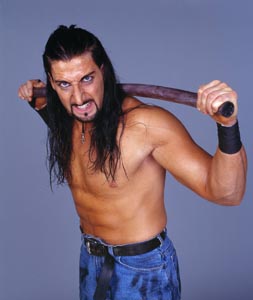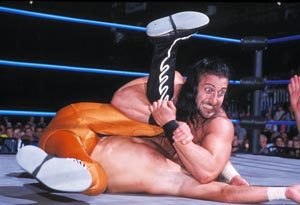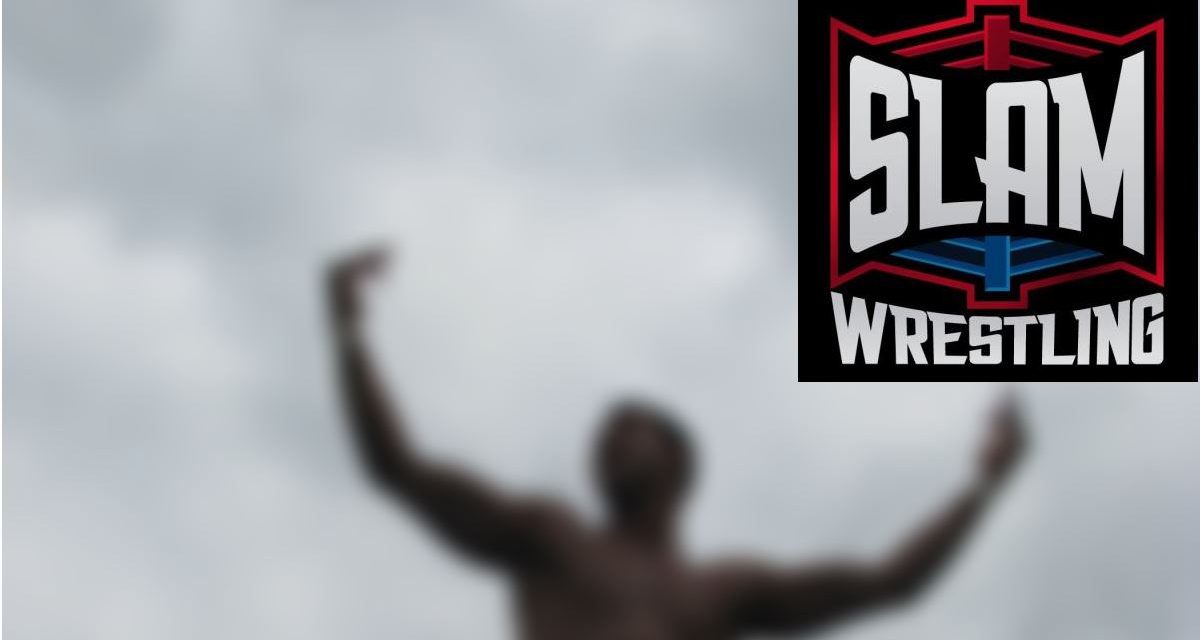He’s been the hardcore champion, cruiserweight champion, and even had a brief stint as part of team with David Flair as tag-team champions. If it’s some success you’re looking for, as well as talent in the WCW locker room, you have to look no further than Chris Ford, AKA Crowbar.
To the casual wrestling fan, Crowbar is a relative newcomer. Most got their first glimpse of this budding star when he appeared on WCW television programming in late 1999, where he was the psycho pal of David Flair. But he does have a history, and an interesting one at that, that brought him to the WWF and ECW before settling into the scheme of things in WCW. He even has ties to Canada, as the New Jersey native explains his formative years while studying to enter the business of wrestling.

Crowbar. — photo courtesy WCW
“I actually started off with ‘Iron’ Mike Sharpe, when I was 17, that was springtime of ’91,” Crowbar told SLAM! Wrestling.
And what did you think of learning with ‘Iron’ Mike?
“Iron Mike Sharpe was a funny guy. He showed me the basics, but I’d be lying if I told you Mike Sharpe showed me how to do a Moonsault. He was a lot of fun. Even though he was never a top guy in the WWF, I always enjoyed watching him, he was always entertaining and, as you know, vocal (laughs), very loud, always screaming and yelling. He had that patented leather forearm thing. Even though he wasn’t a top guy I always enjoyed watching him.”
Crowbar picks up where he left off, discussing how he paid some of his dues and trained for the business, before being the name he is today.
“I worked on the independents for a while. I actually trained a little bit at the East Coast Pro Wrestling School, in Lake Hyawatha, New Jersey shortly thereafter. And when I got my basics down, a long-time friend of mine, Hugh Morrus, Bill DeMott, General Rection, whatever you want to call him, I’d known him since I was 12 or 13, and he showed me how to do the high flying, high-risk maneuvers that have basically shaped my career.”
Of course, it takes more than learning moves to shape a career. You have to prove you’re a good worker, possibly even make a name for yourself, and drop just about everything when the phone rings with a call from a promoter telling you that you’ve booked for that evening’s card — even if it’s a five hour drive away. However, his perseverance paid off. Crowbar got a good enough name in the independent circuit to be wrestling the top talents, which eventually led to him being used by the two major feds, and ECW as well.
“My biggest match on the independent circuit … it was ’94. I had a series of matches against Sabu, which really helped get me on the map. Shortly thereafter, Kevin Sullivan had heard about my work and contacted me to come down to Nitro. At that time Nitro was an hour, and I had a match with Konnan, and also worked a few Saturday Night matches on a nightly basis. I didn’t have a contract because I was full-time in college still.”
Crowbar did eventually finish school, and ended up with a degree in physiotherapy, something he said he may fall back on when his wrestling career finally ends. But upon finishing school, he name was also heating up, and he did a stint in Paul Heyman’s ECW.
“After I finished up with that I worked with ECW for about ten months, which at that point was very convenient, because I was living in Jersey still and was going to school full time. ECW was based basically just out of Pennsylvania at that point, and I was able to attend my classes during the week, and make the shows on the weekend by car ride.”
And his world has been topsy-turvy since, having made an appearance in both the WWF and WCW, as the character Devon Storm, before ending up where he is today.
“When my time in ECW was over, myself and Ace Darling ended up going back to WCW for a few shows. We had two infamous total squash matches on Nitro against Hall and Nash that everybody remembers. It was back-to-back weeks where we were just totally obliterated — not one ounce of offense — and shortly thereafter we went to the WWF for the light-heavyweight division.”
And while thankful to the WWF for the opportunity, it wasn’t the perfect experience, however. Crowbar will at least say it was a tremendous learning experience.
“They brought us in, I think, August of (’97) and at that point in time, they contacted me first, then they decided to bring in Ace to work with me on RAW. It was in Pittsburgh, and that was the night Bret Hart gave that long promo about the enema on Pittsburgh, that went five minutes over. So our match that had originally been slotted for eight minutes on RAW ended up being 30 seconds. They brought us back the following week for a Shotgun Saturday Night match, which went about eight minutes, which was good, but obviously not the exposure for the match we would have gotten on RAW. Then, in November, I participated in the light-heavyweight tournament against Taka (Michinoku). On occasion, me and Ace did enhancement work on him — just basically got killed — for about a year, and the following October they invited me to two camps — the WWF Dory Funk camps. Went to one camp, went well, got home and they invited me to a second camp, which I had thought also went well. It seemed like they had some interest, but nothing ever materialized. At the time I was like ‘What the hell is going on? How am I going to finally break into one of these bigger organizations?’ That following July, Dallas Page opened the door for me, he went to bat and helped to get me signed — and that would be July of ’99.”

Crowbar goes for the pin. — photo courtesy WCW
And the world changed for the grappler as he knew it. First off, he was going to a different organization, meeting different people, and wrestling in a totally different territory. Add to that the fact that the higher-ups wanted to change an aspect of his bread-and-butter — his Devon Storm persona which he had cultivated for years on the circuit — and it made for some interesting changes to his life. Crowbar talks about his metamorphosis from Devon Storm to the man he is now.
“They needed somebody to play David Flair’s crazy partner. At that time they were investing a lot of TV time in David, but at that point in time David was still learning his craft and they needed somebody to do the bulk of the wrestling, and they needed somebody that could pull off the crazy gimmick. On the Saturday Night show I was doing a new, harder edged psychotic and evil Devin Storm character, and they took the character and just tweaked it a little bit, threw in a pair of ripped jeans and Crowbar was born.”
And the rest, as they say, is history. Crowbar has held, or co-held, three titles in WCW, and looks to be a main player in the company’s future. If anything, he’s also proven to them how much he is willing to work and be a part of the team. While David Flair may be a nice guy, he was hardly over or even a competent wrestler at that point, so to baby-sit him has to go a long way in getting Crowbar in the good books of the WCW hierarchy. There was also a similar situation with Daffney, who Crowbar says is great to work with, and whom he has a good working chemistry. Then there’s the forgettable ’70s gimmick. Crowbar has put out quite a lot for WCW in his short tenure there.
All that hard work may now pay-off. Eric Bischoff is soon to be taking over WCW, and he’ll need a few good men to the turn the company around. Plus, Crowbar’s friendship with DDP couldn’t hurt, as he is known to be good friends with the once and future director of WCW. Does Crowbar think this change of scenery will have a good pay-off for him?
“I don’t want to think about anything like that … expectations always lead to disappointments. I would never want to put that amount of pressure on anybody, especially someone (DDP) that had already gone to bat for me. I’m hoping that at this stage in the game I’ve proven myself in every aspect, as far as with the interviews, vignettes, in-ring work, technical wrestling, hardcore stuff and the big bumps. I’m hoping that all that will speak for itself. As well as my work ethic, I’m a good business person and easy to deal with, I’m hoping that all that will hold some weight. WCW definitely needs a leader at this point in time, and Eric has always been a visionary. He did it before … and I hope he can do it again, and I hope I’m part of it.”
While we’re at it, what does Crowbar think of WCW’s chances to score big in the ratings after this take-over?
“If you look at the whole picture, and I’ve said this to everybody, if you look at the roster we have, older and upcoming talent, there’s no reason for our company to be in the sh**ter as we are. If you look at all the people we have, there’s no reason for it, there’s no excuse. We need somebody to take charge and really give us direction. We have the talent, it’s just doing the right thing with it.”
There’s a lot of potential for Crowbar. And some would say he’s realized some of it, including the man himself. He’s already had, what he describes, as a career highlight in working with one of his ring heroes and legends in Terry Funk. What are some of the other goals that Crowbar is looking to accomplish?
“I would like to keep wrestling as long as I can, as long as it’s still enjoyable. I do have a physical therapy degree to fall back on, and I can make a good living doing that, but as long as I’m still having a lot of fun, I’d still like to do this as long as my body allows me to. Obviously, I would like to keep progressing and elevating myself, but as you know that’s not always completely in the wrestler’s hands — the office has a lot to do with it — so all I’m going to do is my part to ensure that when everything is over, if I didn’t achieve the heights that I wanted to get it wasn’t because I didn’t work hard.”

